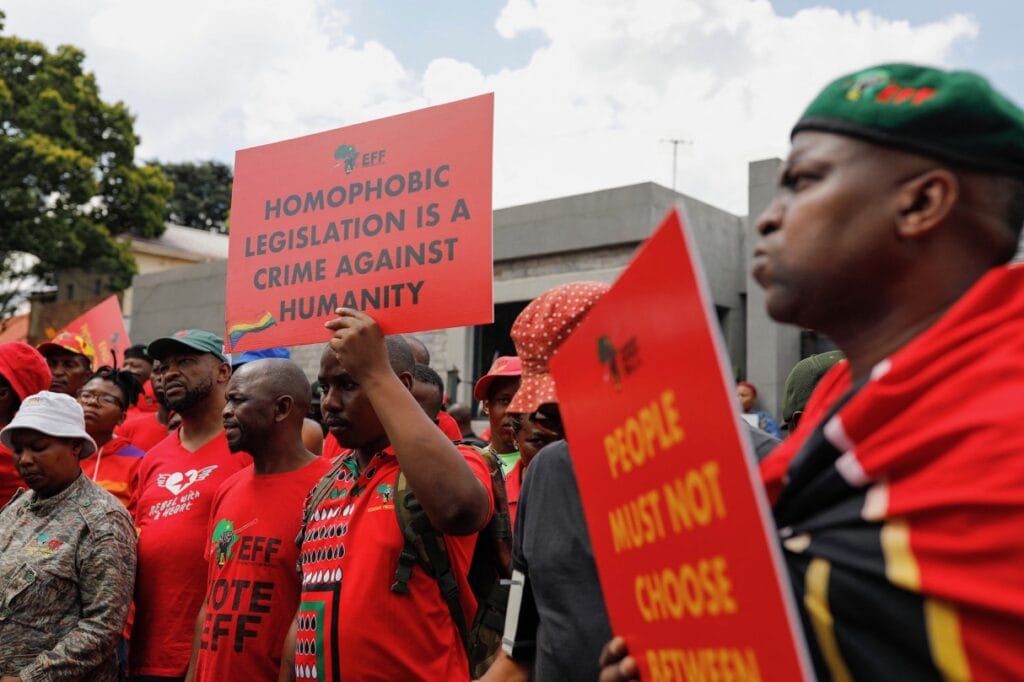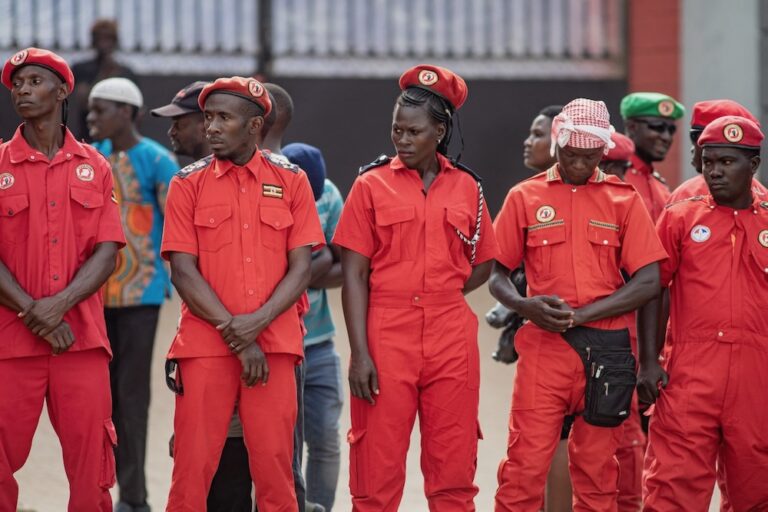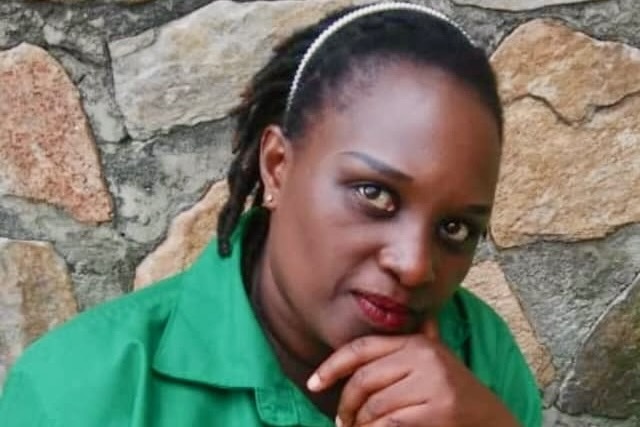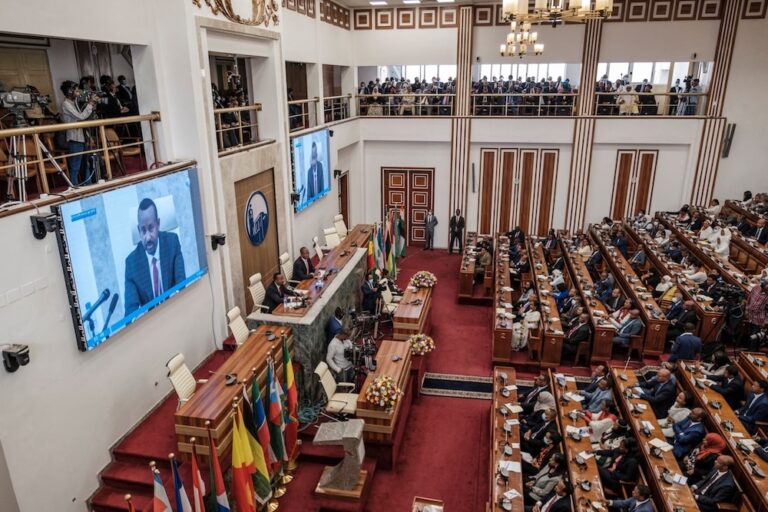May 2023 in Africa: A free expression round up produced by IFEX's Regional Editor Reyhana Masters, based on IFEX member reports and news from the region.
May was a sombre month for the African continent, with the fatal shooting of Cameroonian journalist Anye Nde Nsoh followed by the murder of Basotho radio host Ralikonelo ‘Leqhashasha’ Joki just a week later.
Twenty-six-year old Anye Nde Nsoh, a popular radio host, was shot outside a bar in Bamenda, which is the capital city of the northwestern part of Cameroon. Nsoh is the third journalist killed in Cameroon this year. In January the mutilated body of investigative journalist Martinez Zogo was found in a suburb in Yaoundé and the body of radio presenter Jean-Jacques Ola Bebe, who was shot in the face, was found outside his home.
While it is difficult to determine whether his murder was related to his work, speculation is rife that his death is connected to the ongoing conflict between Cameroonian government troops and separatists in the northwest and southwest regions. This is based on reports by the country’s media, as well as by the Committee to Protect Journalists (CPJ) and the International Press Institute (IPI), which reference a video statement by the leader of a separatist faction that the journalist was shot because he was mistaken for a military commander.
In her condemnation, Audrey Azoulay, director-general of UNESCO, cautioned that: “Journalists working in and around conflict must be protected in line with international humanitarian law.”
Joki’s murder shocked Lesotho’s media fraternity and elicited a swift response from authorities in the form of a nationwide curfew. The Lesotho chapter of the Media Institute of Southern Africa (MISA) expressed their devastation over his killing, which they said: “flies in the face of freedom of expression and press freedom.”
Director-general Azoulay urged authorities to investigate the crime and hold those involved to account.
“Violent attacks on journalists must not be used to discourage them from conducting their fundamental work, on which all of society relies.”
In highlighting the killing of Joki, The Africa Report pointed out that “too often, those speaking truth to power are assassinated with cavalier impunity. This, in turn, encourages further attacks on journalists, human rights defenders, and opposition leaders across the continent.”
Uganda’s harsh anti-gay law puts HIV response “in grave jeopardy”
Discrimination against the LGBTQI+ community in Uganda is being further entrenched, after President Yoweri Museveni assented to the Anti-Homosexuality Act of 2023 this month. As explained by Human Rights Watch: “the new law creates new crimes such as the vaguely worded ‘promotion of homosexuality’ and introduces the death penalty for several acts considered as ‘aggravated homosexuality.’ It also increases the prison sentence for attempted same-sex conduct to 10 years.”
Regional and international condemnation was quick. Executive director of UNAIDS Winnie Banyama explained how the enactment of this new law will cause a relapse in the fight against HIV/AIDS as “people living with HIV who happen to be also gay or transgender women will be further discriminated, there will be more discrimination, they will be pushed away from services that could save their lives.”
In their joint statement with PEPFAR (the U.S. President’s Emergency Plan for AIDS Relief), UNAIDS praised Uganda for leading in the fight to end AIDS and pointed out that with the new law “Uganda’s progress on its HIV response is now in grave jeopardy.”
Impact award for MFWA executive director
There was cause for much celebration for the Media Foundation for West Africa in May, when executive director Sulemana Braimah was named this year’s recipient of the prestigious James and Carol Hovey Eisenhower Fellowships Impact Award.
The award is in recognition of his important work establishing Ghana’s investigative journalism initiative – The Fourth Estate. Braimah conceptualised the idea of setting up a non-profit, public interest journalism unit to hold government accountable during his stint as an Eisenhower Fellow in 2019.
Two years after his return home, Braimah managed to galvanise the resources to establish the aptly named The Fourth Estate, which “has established itself as a leading platform for credible, public-interest investigative journalism in Ghana.” The presence of The Fourth Estate on the Ghanaian news media landscape has been impactful, and a deep dive into the declaration of assets by public officeholders as required by law led to 294 political appointees declaring their personal assets.
Africa Media Convention adopts Lusaka Declaration
The second African Media Convention convened by the Southern African Editors, together with the Media Liaison Committee and with the support of UNESCO, took place in Lusaka from 11 to 13 May.
It brought together over 300 delegates, including media experts, scholars, students, journalists, journalists’ unions and associations, editors, the public and private sector, and other media stakeholders from across the continent.
- A session convened by the Collaboration on International ICT Policy for East and Southern Africa (CIPESA) unpacked the challenges journalists are facing, as they work to produce good journalism in a fast-paced setting, maintain their online visibility, all while consistently upholding journalistic principles and ethics.
- Speaking to the proliferation of disinformation and misinformation, Soren Johannsen, BBC Media Action’s Zambia country director, pointed out that fact-checking initiatives “shouldn’t try to just correct and verify, but help users understand where false information is coming from, the motivation and the consequences.”
- Noting the continuous violations against the media, the participants emphasised the need to implement the UN Plan of Action on the safety of journalists.
- At the end of the conference, the participants adopted the Lusaka Declaration, which places emphasis on the key issues besieging the continent, such as restrictive legislation, the increase in attacks against the media, the criminalisation of journalism through cybercrime laws, as well as issues of surveillance and interception of communication.
- As reported by Media Rights Agenda, the declaration also “highlighted the unique challenges faced by women journalists and emphasized the need for provisions that adequately address their concerns, including online violence, sexual harassment, and the gender pay gap.”
In brief
A union for content moderators: On 1 May, International Workers Day, over 150 African content moderators engaged by third-party outsourcing companies to work for big tech platforms voted to unionize. The initiative was driven by Daniel Motaung, a whistleblower who was fired in 2019 after trying to establish a union during his stint as a content moderator for Meta’s Kenyan outsourcing partner, Sama.
Congolese gunmen who had been targeting radio journalist Jean Christian Bafwa, kidnapped radio presenter Deogratias Dhessaba instead and brutally assaulted him. He was released after the gunmen realised they had made a mistake.
Fact-checking and elections: Ahead of Liberia’s October 2023 elections, the United Nations Development Programme has supported the launch of an automated fact-checking tool, iVerify, which is managed by Local Voices Liberia (LVL), a network of journalists based in the capital, Monrovia.
Rise in media violations: The latest Press Freedom Index report launched on 23 May by Human Rights Network for Journalists in Uganda (HRNJ-Uganda) zoned in on the increase in violations against journalists in the country, as well as the hostile environment they operate in.
Death of an “intellectual rock star”: Friends and colleagues expressed shock and grief at the passing of broadcaster and author Eusebius McKaiser. McKaiser was well known for speaking out against homophobia and bringing issues of social justice to the fore.



